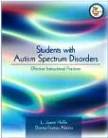Earlier this week two government studies indicating increasing prevalence of autism spectrum disorder in children in the U.S. were in the news, including “Autism is more widespread, U.S. studies show, but why?” in USA Today.
The first study, “Prevalence of parent-reported diagnosis of autism spectrum disorder among children in the US, 2007,” was published online by Pediatrics, the official journal of the American Academy of Pediatrics, on Oct. 5.
In response, the Centers for Disease Control issued a statement that similar findings will appear in a report from CDC’s Autism and Developmental Disabilities Monitoring (ADDM) Network later in the year, and “these data affirm that a concerted and substantial national response is warranted.” CDC recommended the Interagency Autism Coordinating Committee (IACC) web site for more information, such as its “Summary of advances in autism spectrum disoder research: Calendar year 2008.”
 In addition, Andersen Library has materials on autism. Search HALCat (Andersen Library’s catalog) to find books titles such as Healing and preventing autism: A complete guide (2nd-floor Browsing Books, RJ506.A9 M4252 2009), Autism spectrum disorders: Psychological theory and research (3rd-floor Main Collection, RC553.A88 B694 2007), and Students with autism spectrum disorders: Effective instructional practices (3rd-floor Main Collection, RJ506.A9 H42 2007).
In addition, Andersen Library has materials on autism. Search HALCat (Andersen Library’s catalog) to find books titles such as Healing and preventing autism: A complete guide (2nd-floor Browsing Books, RJ506.A9 M4252 2009), Autism spectrum disorders: Psychological theory and research (3rd-floor Main Collection, RC553.A88 B694 2007), and Students with autism spectrum disorders: Effective instructional practices (3rd-floor Main Collection, RJ506.A9 H42 2007).  Search article databases to find articles such as “Trends in autism spectrum disorder diagnoses: 1994–2007” (Journal of Autism & Developmental Disorders, Aug. 2009, v.39, no.8, pp. 1099-1111) and “Timing of identification among children with an autism spectrum disorder: Findings from a population-based surveillance study” (Journal of the American Academy of Child & Adolescent Psychiatry, May 2009, v.48, no.5, pp. 474-483).
Search article databases to find articles such as “Trends in autism spectrum disorder diagnoses: 1994–2007” (Journal of Autism & Developmental Disorders, Aug. 2009, v.39, no.8, pp. 1099-1111) and “Timing of identification among children with an autism spectrum disorder: Findings from a population-based surveillance study” (Journal of the American Academy of Child & Adolescent Psychiatry, May 2009, v.48, no.5, pp. 474-483).
Please ask a librarian for assistance with finding materials.

The University Library is a federal depository with many federal, state, local, and international documents on a variety of current and relevant issues available to you in print, microfiche, CD-ROM, and electronically. Come check out your government at the University Library!
